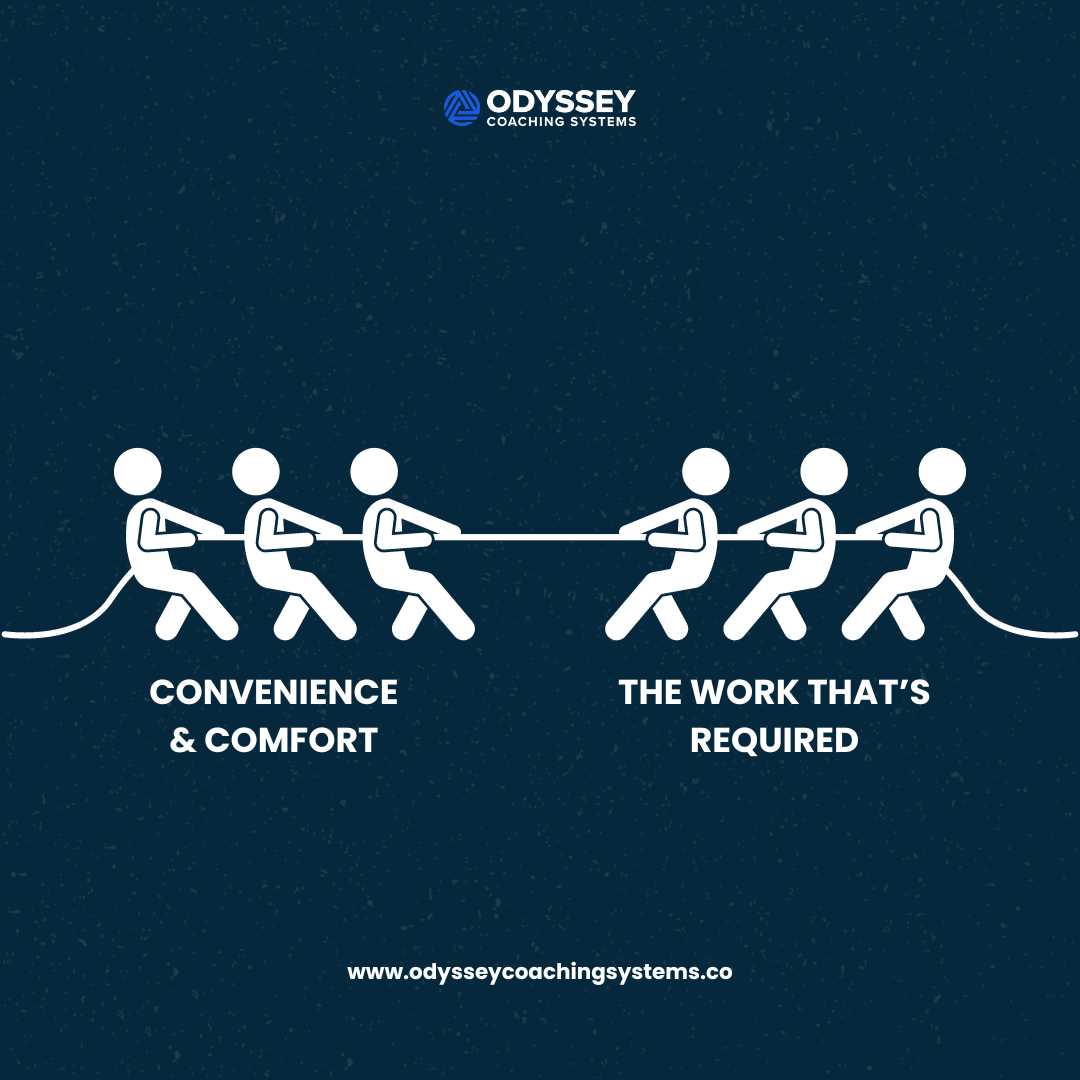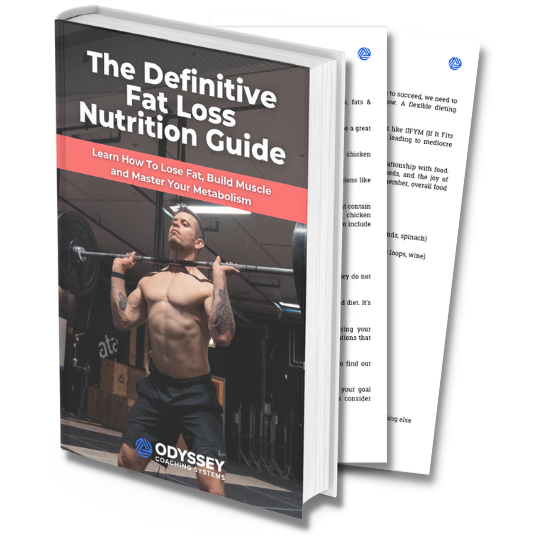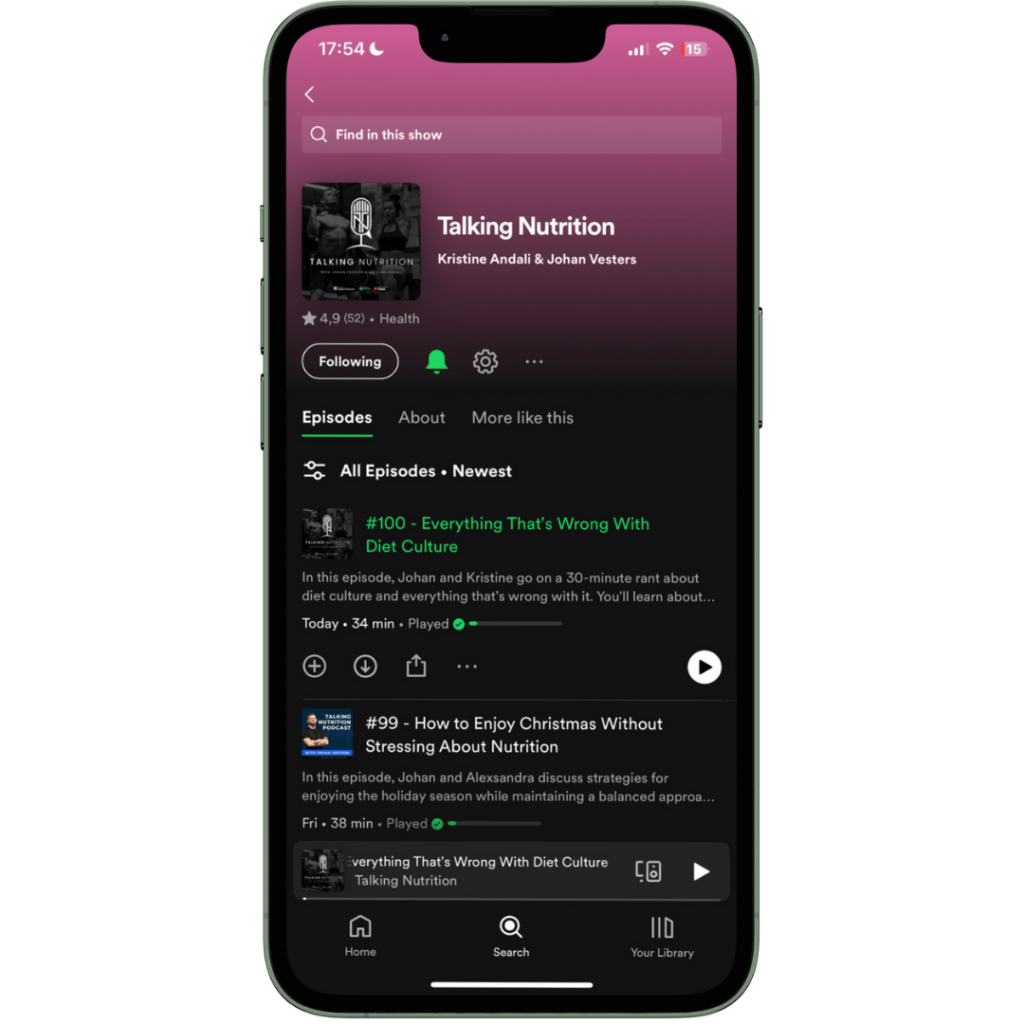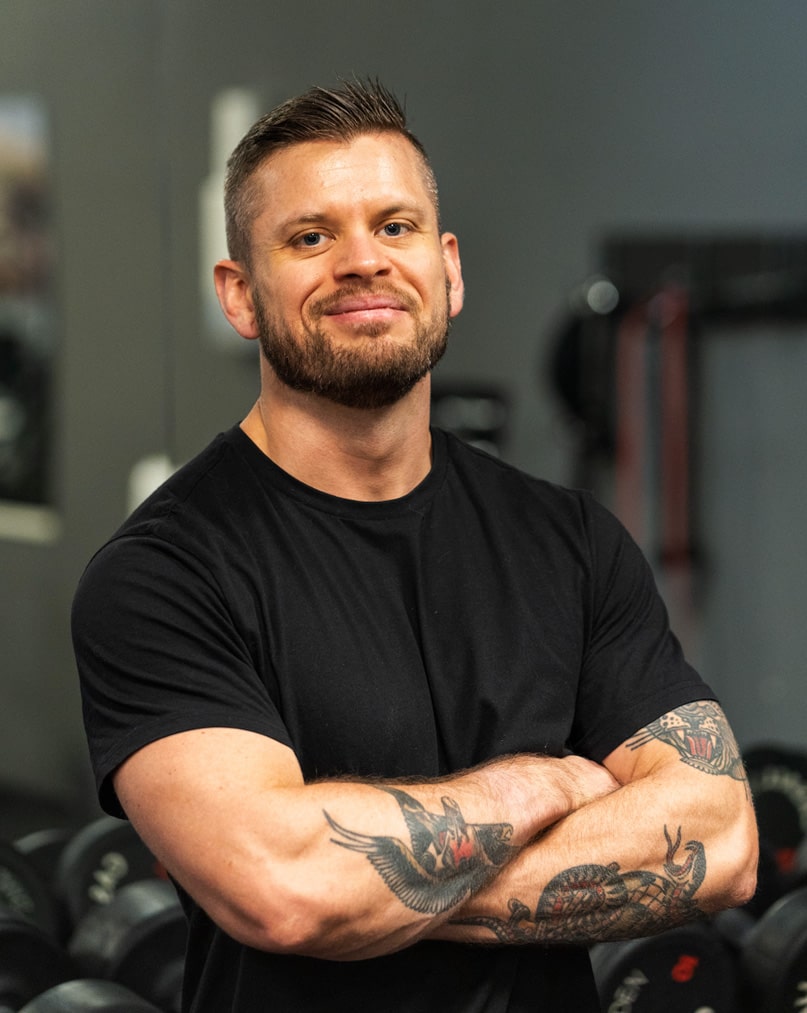In this 4-part article series, we explore the four keys to a successful health and fitness journey, or as we call it: your Odyssey.
These four essential keys – the Stoic Virtues of Courage, Wisdom, Temperance, and Justice – will help you reach your long-term goals, continue to learn and grow, deal with setbacks along the way, keep going when things get difficult, and ultimately live a long, strong, and healthy life.
In the previous two articles, we dove into Courage and Wisdom. In case you haven’t yet, I highly suggest checking those out first, as these four articles all play into each other.
Now, let’s talk about our next key: Temperance.
The Human Brain in a World of Excess
We live in a world of convenience, comfort, instant gratification, and excess, where everything is available at all times in unlimited amounts.
Everything we want needs to be more available, we want more of it, and we want it faster, preferably without putting in much effort.
We get impatient when our Amazon order (that’s being shipped from across the world) doesn’t arrive within 24h, and we complain when our Foodora order (for which we don’t even have to leave the house) takes 5 minutes longer than expected.
In our defense, the human brain is wired to take the path of least resistance in order to conserve energy, something that has helped us humans survive for hundreds of thousands of years (without modern day luxuries). So it does make sense that we tend to prefer taking the easy way out.
Additionally, we spend most of our days sedentary, and even if we do move around at work, we tend to spend most of our free time on the couch watching series or playing video games.
Generally speaking, life’s pretty comfortable!
Though in order to get better both physically and mentally, we need to take on challenges. And these days, there’s relatively little challenge to be found in our direct environment. We don’t need to step outside of our comfort zone to get most of the things we want, we don’t even have to leave the house anymore to look for food.
By now, based on what you’ve learned in these three articles (Courage, Wisdom, Temperance), you should begin to realize that all of that comfort, excess, and instant gratification is quite literally the opposite of what’s required to level up.
This is where Temperance – the practice of moderation, self-control, and self-discipline – comes in. You see, you’re going to have to look for the challenges in order to improve.
A true Action-taker knows that comfort and convenience do not support growth, is aware that it’s in our nature to choose the path of least resistance, and is willing to challenge themselves because it’s what’s required in order to level up.
The Truth about Finding ‘Balance’
Before we get into exposing ourselves to challenges, we need to address a word that comes up 9/10 times when someone’s health and fitness goals are discussed: Balance.
So far you’ve learned about hard work, overcoming obstacles, and dealing with discomfort. All of which are essential for growth.
However, there’s no Yin without Yang and the other way around. And there’s no growth without the opportunity to Recharge.
In a fitness example: you challenge/stress a muscle by lifting weight, which in the moment actually damages the muscle. Then, if you take in sufficient nutrients, rest, and sleep enough, will the body adapt and grow a bigger and stronger muscle.
The best pro-athletes know this and prioritize that recovery side of the equation more than others, which is what sets them apart from the rest. They train hard, of course, but it’s not always go-go-go.
There’s a time to work hard, push yourself at the gym, chase your goals, and get uncomfortable. But there also needs to be a time for rest, sleep, recovery, nourishment of the body, fueling sufficiently, and maintaining your results while enjoying flexibility. This is why periodization and stress management are at the forefront of what we do in our coaching practices.
Now, where the word ‘Balance’ gets taken out of context and misused, is when people want to see results without the sacrifice that’s required for realizing those results. This goes back to that convenience we’re oh-so used to these days.
We want it all, without the effort.
The muscle, without the hard workout.
The fat loss, without the necessary caloric restriction.
The flexibility, without practicing moderation.
The ying, without the yang.
It’s either/or, it’s all or nothing. A tug of war between the convenience, flexibility and enjoyment you want, and the work that’s required to reach your goals. All while forgetting that in reality, these two need to exist in harmony…
On this healthy and fitness journey, your Odyssey, you’ll eventually be able to achieve what most would consider ‘Balance’: to enjoy your long-term results while keeping things flexible. However, the only way to get there, you’ll have to go through seasons where ‘balance’ in the traditional sense doesn’t exist.
A true Action-taker understands that ‘balance’ is not a matter of ‘this or that’, and aims to create a life where both sides of whatever they aim to ‘balance’ work together towards the same end goal.

Moderation in All Things
I often tell our online nutrition coaching clients the following:
The bad news is that you CAN NOT have it all, at least not all at once.
The good news is that you CAN have it all, just not all at once.
Unfortunately, as we talked about earlier, what we actually want is to have it all, at once.
Before you continue reading, please know that I too need to continuously work on the things we’re about to get into. We all do. This isn’t to judge you in any way, but more to remind us both that we’re probably better off living with certain limits to comfort and consumption.
Instead of one cookie, we want the whole pack.
Instead of one episode, we need to binge-watch a whole season.
Instead of a few drinks, we need to get shit-faced.
Instead of eating until we’re full, we need to stuff ourselves.
Instead of 3-5 workouts a week, it has to be everyday otherwise it doesn’t count.
You lose 1 pound or kilo in one week, but it’s ‘not enough’.
And let’s not get into doom-scrolling social media…
We need more stuff, more dopamine hits, more more more. When is it enough? When do we realize that too much of anything, really isn’t a good thing?
Moderation really is key, and that goes for anything.
Flexible foods, ‘clean’ foods, workouts, sleep, technology use, fat loss phases, muscle gain phases, performance, work, time off, and the list goes on… The sooner you accept that neither ‘too much’ or ‘too little’ of these is a good thing, the sooner you can move forward towards your goals.
Out of all 4 virtues, Temperance is the one that plays into your fitness journey the most. Moderation in all things is what’s required for you to be successful long-term, and the only way to ‘train your moderation muscle’ is through self-discipline.
A true Action-taker accepts they can’t have it all at once, that neither too much and too little are a good thing, and realizes that Moderation in all things is key.
The Art of Doing Hard Things
Doing difficult things is good for both your mind and body.
The workout never feels comfortable, but you’ll feel good afterwards because you did the work. Going through a fat loss phase is never fun, but you will be proud of your own achievements. You may hate your alarm clock when it goes off early, but you’ll feel better from not having to rush in the morning and actually getting some quiet-time.
In each of these situations, there’s a short-term sacrifice for a long-term benefit.
This is also something that can make it hard to do the work and keep doing the work, because it requires delayed gratification. You do the work now to eventually – which in health and fitness is usually weeks or months – see the desired outcome.
It’s the opposite of what we’re used to in our world of excess and instant gratification (getting the reward NOW). However, to make it long-term you’ll have to make long-term decisions.
So what about ‘doing hard things’? Here are a few examples:
- Lifting weights
- Doing cardio
- Signing up for a competition
- Dieting
- Muscle gain phases
- Fasting
- Cold plunges (the actual benefit to this is that you’re doing something uncomfortable)
The philosopher Seneca said: “We treat the body rigorously so that it will not be disobedient to the mind”. By doing hard things you show yourself that YOU are in charge, that YOU make the decisions, and that YOU have what it takes to reach your goals. It builds character and resilience.
Doing hard things is not all physical though, what’s often even more difficult are things like:
- Tracking your food
- Going to be earlier even though you want to stay up
- Waking up earlier
- Meditating or journaling
- Having hard conversations with friends, family members, or your partner
- Applying for that job you want, or starting your own business
- Asking that person to go on a date with you
- Meal prepping
- Saying no
Neither list is all-inclusive, but you get the idea. It’s all stuff of which we know it has a positive long-term outcome. However what makes these things hard to do is the short-term sacrifice that comes with it. We need to trade the more comfortable, pleasurable, fun thing for something uncomfortable, laborious, and sometimes difficult.
Getting good at making these kinds of trade-offs is what will allow you to be successful. Each and every day, life puts you in situations where you have to make a decision, which depending on what path you choose, has a certain outcome.
Now that’s not to say you need to sacrifice everything fun, flexible, and comfortable. Remember, moderation in ALL things. But let’s create a habit of being more mindful about our decisions, and learn how to make better decisions.
A true Action-taker understands that the discomfort of hard work in the long-term is better than the discomfort of NOT taking ownership of their health and fitness. They set out to do hard things in order to build character, a strong body, and a strong mind.
Keeping Your Emotions in Check
Can you think of a time when you let your emotions get the best of you? Ever acted without first taking a step back to see clearly, and made the wrong decision or move based on fear or anger?
I know you have, because we all have.
Self-control and self-discipline doesn’t come down to just doing hard things and getting uncomfortable. It’s also about the ability to control your thoughts and emotions and act from a place of logic, something that’s easier said than done but that just like the Growth Mindset, can be cultivated overtime.
“The Greeks had a word for keeping your emotions in check: Apatheia. It’s the kind of calm equanimity that comes with the absence of irrational or extreme emotions. Not the loss of feeling altogether, just the loss of the harmful, unhelpful kind.” – Ryan Holiday (The Obstacle Is The Way, page 29)
Sometimes we forget that a thought, feeling, or emotion doesn’t have to become ‘a thing’. It can be there, you can acknowledge it, but you don’t have to act on it. Remember that there are certain things within your control, and others outside of your control.
Thoughts, feelings, and emotions will show up, usually because of things that are outside of your control. And you have all the right to be pissed off, sad, frustrated, or demotivated in the moment. This is really what Stress in the psychological sense is, a response to a perceived threat or challenge.
But then also catch yourself, and remember that how you respond to the situation is 100% within your control, and that YOU get to decide where this goes.
Will you respond instantly, emotionally and make an irrational decision? Or will you take a step back, take a moment, and focus your energy towards figuring things out?
Oftentimes, the simple (not easy) solution here is to zoom out and think long term in order to see things more clearly.
The same goes for Fear and Anxiety, which is similar to Stress, but different in that it’s a response to something that hasn’t happened. Thoughts like “What if _”, or “I hope _ doesn’t happen” are nothing more than borrowed stress.
Remember that you live in the moment, and that you can not influence what has happened in the past or what will happen in the future. What you CAN do however, is focus on what you do in the present moment. Again, also Anxiety isn’t easily disregarded, but when you take a step back, you’ll realize that most things you fear never come true after all.
Lastly, exercise control over extreme cravings and resist the temptations of pride, greed, wrath, envy, lust, gluttony, and sloth. We all have our vices and weaknesses, we all have all sorts of thoughts, feelings, and emotions going on inside of our heads, the goal is not to NOT have them, that would be impossible. Just remember that at the end of the day, you don’t HAVE to act on them.
A true Action-taker acknowledges their emotions and thoughts, but doesn’t act without first taking a step back to think rationally. They may experience Stress, Anxiety, and extreme Cravings, but keep their emotions and impulses in check, knowing THEY still get to decide how they respond to a situation.
Cultivating Self-Discipline
Similar to the previous articles, also this one is supposed to INSPIRE you to take action. We didn’t get into specific tools and tactics, but discussed what needs to be done. Now it’s up to you to begin to exercise self-control, practice moderation, and create self-discipline.
Some of my favorite ways to do so is through continuous self-reflection by mediation, journaling, or similar practices that allow you to sit with your own thoughts and work through stuff.
Practicing mindfulness also allows you to be more in-the-moment and can help you catch yourself before you act emotionally or irrationally. Try having deliberate moments where you check in with yourself and slow down. This can be done weekly, daily, or even right before or during certain scenarios where temptations may be high. Again, it’s a pro-active practice that only through repetition can help you become more mindful.
Practice gratitude. Write down what you’re grateful for, or think about it when you’re on a walk. Think about everything you DO have, and how you would feel if you didn’t have them. Realize that you actually have it pretty good, stressing about what you DON’T have, actually isn’t helpful at all.
Create self-discipline through exposure, not avoidance. Do hard things like working out, and get uncomfortable on purpose to build mental and physical resilience. Show yourself that you can deal with hard things, and that YOU are in full control, not your emotions.
And remember: Moderation in ALL things.





